For the past couple of days, if you’ve been reading the Daily Office reading from the Hebrew Scriptures, you might have noticed that Saul has been out chasing after Kish’s donkeys. (More specifically, in the Hebrew, they are female donkeys. Perhaps there’s hidden allegory in that…or perhaps Kish knew what a lot of us donkey owners knew, that keeping jack donkeys is like keeping a stud horse, only worse, so he simply stuck with keeping jennies.) Evidently they were rather wily donkeys, because Saul and his servant boy had looked for them so long Saul had deduced that they’d better turn back before Kish worried more about them, than the donkeys.
The desire to hurry up and find the donkeys led Saul to seek out a reputable seer, who turned out to be Samuel, whom it just so happened God had recently revealed that Samuel would meet a fellow from the land of Benjamin and that he should anoint him ruler over Israel. Their meeting is the intersection of these two stories; Samuel, of course, anoints Saul, and here is where today’s reading picks up.
Although very few of us have actually gone out to chase cantankerous wayward donkeys, what they represent is a common occurrence in life–that whole business of thinking our focus is on a specific task in life–yet, in the end, something else happens, and it turns out that what ultimately happened was actually the true focus in the story. Serendipity probably pays a much larger role in our lives than we realize. Take, for example, the story of George de Mestral. He was hunting in the Jura Mountains in Switzerland, and he thought his task was to get the cockleburrs out of his dog’s fur. Yet, in the end, it turns out that he invented Velcro.
Saul and his father’s runaway donkeys open us up to the possibility,that what we call serendipity, and ascribe to random chance, might actually be intersections with the divine in a larger narrative, rather than simply a shaggy dog story (or, in this case, a shaggy donkey story.) The original Hebrew in this reading suggests exactly that. The word used for “ruler”–nagid–although often roughly translated as “prince” or “heir apparent” implies a God-directed process, as opposed to the Hebrew word for king–melek–which implies a human-directed process.
Yet, even at the moment the focus of the story changes, we may be slow on the uptake. Saul doesn’t totally get what’s happened until he meets the band of prophets who “turn him into a different person.” When he does get it, he’s not yet ready to admit it. At the end of our reading, when Saul’s uncle interrogates him, he confines his discussion to the donkeys, but conveniently omits “Oh, yeah, and by the way, that Samuel guy told me I was to rule over the people.” Sometimes it takes us a while to accept our own transformations, let alone expect others to accept them.
Today’s reading intimates that discernment of God’s larger narrative is a process, as much as we’d prefer a magic moment of clarity. Sometimes, things are obscured to us because God is still working on them.
When is a time in your life you were dead sure what your task was, only to discover that God had a totally different task in mind?
Maria Evans, a surgical pathologist from Kirksville, MO, is a grateful member of Trinity Episcopal Church and a postulant to the priesthood in the Episcopal Diocese of Missouri. She occasionally finds time to write about the obscurities of life, medicine, faith, and the Episcopal Church on her blog, Kirkepiscatoid.
Image: “Byzantinischer Mosaizist des 5. Jahrhunderts 002” by Byzantinischer Mosaizist des 5.

